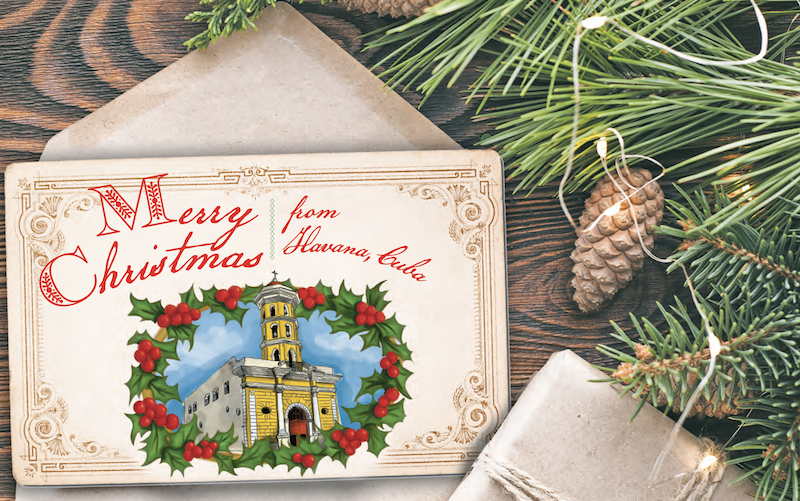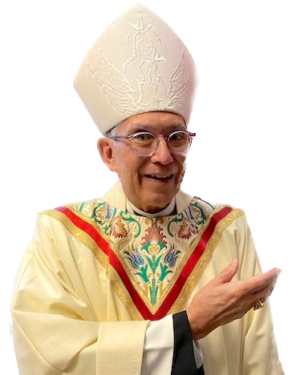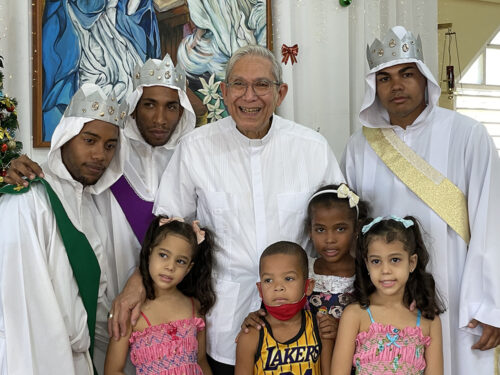
PROSPECT HEIGHTS — As a little boy, Auxiliary Bishop Emeritus Octavio Cisneros loved going to his grandmother’s house for Christmas, just like the popular holiday song “Over the River and Through the Woods.”
But there was no “drifted snow,” because his grandmother lived in Marianao on the outskirts of Havana, Cuba. Still, the holiday joy 60 years ago is a fond memory for Bishop Cisneros, born in 1945 in Las Villas, Cuba.
“We actually had dinner on the 24th — Christmas Eve,” he said. “My mother had 11 brothers and

sisters, so you can imagine there were a lot of people: my aunts and uncles and my cousins. It was a household filled with food.”
The main dish was roast pork. His uncles slaughtered a pig early on Christmas Eve morning and
“I have lots of cousins,” Bishop Cisneros said. “Those were beautiful moments.”
Traditional dishes included black beans, white rice, and treats filled with sweet, creamy nougat made from almonds and honey.
But the celebration continued past Christmas Day to Jan. 6 — the feast of the Epiphany, commemorating the visit of Three Wise Men or Kings (the Magi) to the newborn Christ child.
“That was the day that we were waiting to receive our gifts,” Bishop Cisneros said.
He noted that Cuba had a tradition like Santa Claus. Local stores hosted three men dressed like the Three Kings who heard holiday gift requests from good boys and girls.
“Actually, Santa Claus mimics the Three Kings,” Bishop Cisneros exclaimed. “Truly, the religious celebration of the Epiphany is of Christ’s manifestation as the light — bringing light and happiness to everyone.”
But, he noted, succeeding generations did not experience these holiday traditions after Fidel Castro came to power in 1959.
In earlier interviews, Bishop Cisneros described how the communist dictator allowed churches to stay open, but ousted most priests from the island nation. And, in 1969, he abolished Christmas.
“Of course, it makes you sad,” he said. “Those who kept the faith privately celebrated, but it wasn’t something you could do publicly.”

Young people, he said, were discouraged from participating in the faith, so many stayed away from church and did not learn the customs.
Bishop Cisneros was a teenager when he came to the U.S. a couple years after Castro took control.
His arrival was part of “Operation Peter Pan” in which 14,000 children were allowed to leave Cuba.
Gradually, however, things on the island changed.
Castro eased restrictions on the Church when Pope John Paul II visited Cuba in 1998, presumably as a publicity stunt, Bishop Cisneros said.
Still, he added, Castro restored Christmas. Traditions are gradually returning as the nation deals with extreme shortages of food and fuel.
Bishop Cisneros traveled to Santiago on the east side of Cuba last January. There, he visited a parish where a priest from Poland celebrated the Epiphany with children.
“And the altar servers were dressed as the Three Kings,” Bishop Cisneros said. “It was a wonderful moment in that church. It brought me back to all the memories and the joy of what we celebrated, which is Christ.”
Editor’s note: This is the second in a series of six articles where priests in the diocese who come from other countries reflect on their boyhood parishes and hometowns at Christmas.
